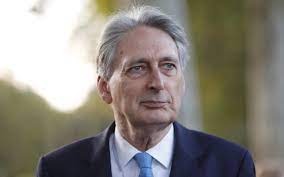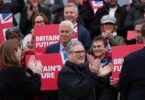Nick Timothy
Since the demise of Boris Johnson, the need for politicians to tell the truth has become en vogue among those who consider themselves of a nobler spirit. Alastair Campbell – who has seemingly forgotten about weapons of mass destruction, Iraq, Dr David Kelly, Bernie Ecclestone, cash for honours, tax rises, tuition fees and top-up fees – now says Johnson must be “accountable” for the “lies” he supposedly told to persuade people to vote for Brexit.
But Campbell is far from alone. The lies, most recently, have come thickest and fastest about the single issue that has done most to destroy trust in the British political system: immigration. Every manifesto of every party to win an election in the past quarter century has promised immigration control, yet every government has failed to deliver it. We have had more immigration in this time than in the past 2,000 years combined.
In the past year, net migration stood at 606,000 – a number that was unthinkable even 12 months ago. And yet many politicians are clamouring for even more. Ministers brief the newspapers that the labour market is too tight, and companies need more workers. And some former ministers are starting to say the quiet part out loud. Philip Hammond, the former chancellor, has said relaxing immigration controls will create more competition for jobs and help to reduce inflation – and therefore interest rates – by reducing the power of workers to seek increases in pay. To respond to rising housing costs amid a housing shortage by creating more demand for limited stock may seem eccentric. But there is more to question. When companies can recruit from anywhere in the world without trying to do so from within Britain first, and at salaries that are often no higher than the minimum wage, what controls would Hammond relax? We already have the most generous immigration system in the Western world.
But the inflation crisis – and the solution proffered by Hammond – has revealed a truth long denied by ministers and officials. For years they have insisted that immigration does not cause job displacement or hold down wages. They have done so despite academic studies and evidence from the Government’s own Migration Advisory Committee saying the opposite. But now they admit it themselves. Inflation, according to Chris Patten, is high in part because Brexit has made it “more difficult for us to import?… labour”. Of course it is possible to argue that while economic demand rebounded to its expected path following Covid, the labour force has not. Migrant workers, then, might fill gaps caused by older people not returning to the workforce and the rise in numbers of people not working due to illness. But even this does not mean immigration – which zealous liberals forget brings with it serious economic and social challenges of its own – should automatically rise.
First, the tight labour market is not leading to inflation-busting pay rises. Overall, the country is having its real-terms pay cut. And this follows years of pay stagnation, which leaves us no better off than we were in 2005. Second, the rise in inflation started with an international supply shock, and has been exacerbated by the failures of monetary policy over the past 15 years or so. Third, the policies pursued to get inflation down now – steep interest rate rises and attempts to drive down pay – may end up making our difficulties worse next year when, as seems likely, we and other countries slide into recession. But most obvious is that the demand from politicians – whatever the problem, whatever the context, regardless of our ability to cope – is for more immigration overall, when if there is a need for a particular kind of immigration, common sense should lead us to change the balance and profile of migration while remaining true to the need to reduce, drastically, the numbers overall.
Yet this seems an impossibility for our politicians. We have created a higher education model entirely dependent on income from foreign students, whatever their quality, at the expense of British kids who are displaced from our best institutions and courses, and that fails to offer technical and vocational alternatives. Partly as a result we have skills shortages that cause demand for migrant workers to grow. Dependence on their ready supply kills the incentive to invest in labour-saving, productivity-improving tech, and the skills of people already here. MPs grow hysterical when ministers confirm that not every unfortunate individual from every unfortunate country can come here via a “safe and legal route”. This is partly down to the failing economic model upon which Britain has relied for decades. Productivity is poor, growth low, and pay stagnant. But mass immigration grows our GDP, if not GDP per capita, and reduces debt as a percentage of our economy without us having to do much. The lack of imagination, vision and ideas of how we might do things differently is part of the problem. But so too is the ideology of many of our politicians. The Right sees immigration as an economic shortcut, the Left through its obsession with radical diversity and identity politics.
Which brings us back to the lies. Last week, responding to the argument that mass immigration was increasing rental prices – a statement of fact – a BBC journalist said, “who you gonna get to build all those homes? British workers don’t seem too keen on learning construction skills.” But he was wrong: non-UK nationals account for 13 per cent of construction workers in the buildings sector, eight per cent in specialised construction, and seven per cent in civil engineering. Shortly afterwards, Sadiq Khan, the Mayor of London, claimed, “this city was built by migrants, by refugees” – a statement which, like the claim that we “have always been a country of immigration” – is verifiably false. Those who believe immigration should be reduced and controlled are often presented by liberals as zealots and extremists who peddle a lie – but on this vital issue, where change is irreversible and comes with real consequences, the opposite is the truth.
The Telegraph







